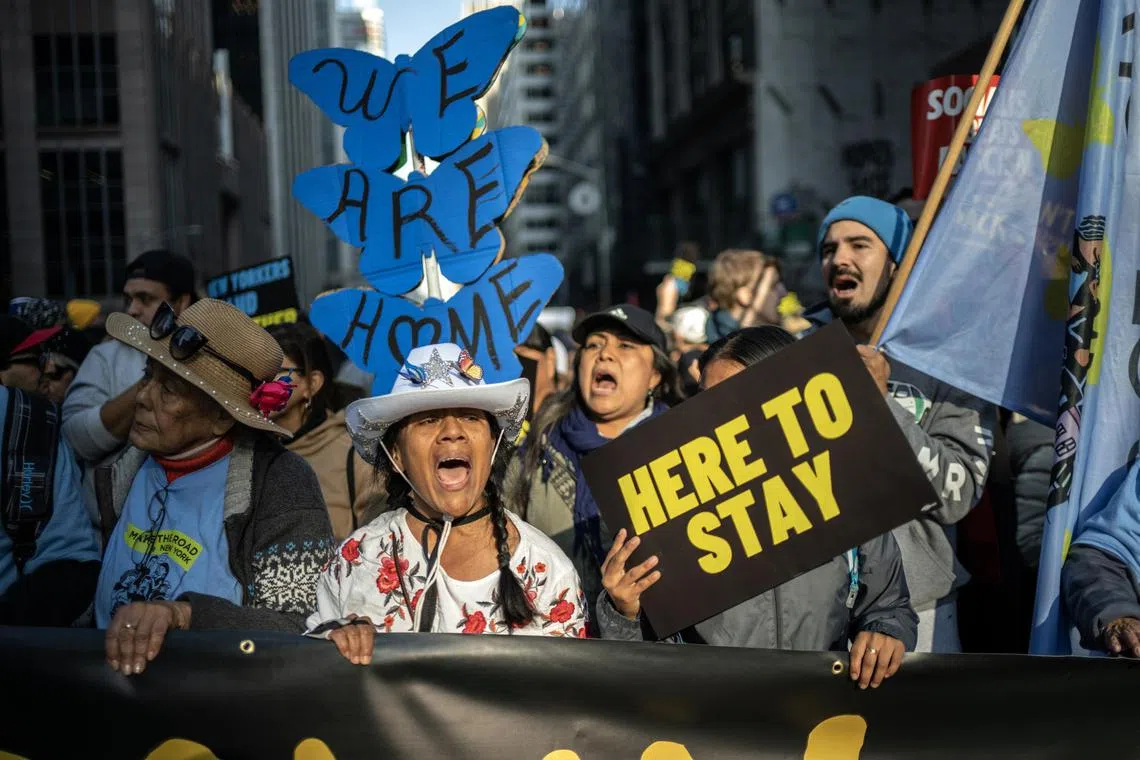Trump confirms plan to use US military to assist in mass deportations
Sign up now: Get ST's newsletters delivered to your inbox

US President-elect Donald Trump confirme he intended to declare a national emergency and use the military to assist in his plans for mass deportations of undocumented immigrants.
PHOTO: NYTIMES
Follow topic:
WASHINGTON – US President-elect Donald Trump
On his social media platform, Truth Social, Trump responded overnight to a post made in November by Mr Tom Fitton, who runs conservative group Judicial Watch and who wrote that Trump’s administration would “declare a national emergency and will use military assets” to address illegal immigration “through a mass deportation programme”.
Around 4am, Trump reposted Mr Fitton’s post with the comment, “True!!!”
Congress has granted presidents broad power to declare national emergencies at their discretion, unlocking standby powers that include redirecting funds lawmakers had appropriated for other purposes. During his first term, for example, Trump invoked this power to spend more on a border wall than Congress had been willing to authorise.
In interviews with The New York Times during the Republican primary campaign, described in an article published in November 2023, Trump’s top immigration policy adviser Stephen Miller said that military funds would be used to build “vast holding facilities that would function as staging centres” for immigrants as their cases progressed and they waited to be flown to other countries.
The Homeland Security Department would run the facilities, he said.
One major impediment to the vast deportation operation that the Trump team has promised in his second term is that Immigration and Customs Enforcement, or ICE, lacks the space to hold a significantly larger number of detainees than it currently does.
That has sometimes led to allowing asylum seekers into the country while they await court dates with immigration judges, a practice critics deride as “catch and release”.
The Trump team believes that such camps could enable the government to accelerate deportations of immigrants who fight their expulsion from the country. The idea is that more people would voluntarily accept removal instead of pursuing a long-shot effort to remain in the country if they had to stay locked up in the interim.
Asked about the proposal, Ms Sabrina Singh, a spokeswoman for the Pentagon, declined to comment, calling it “a hypothetical”. In general, she added, such a plan would typically undergo “a rigorous process” before being enacted, but she declined to elaborate.
Immigrant advocates assailed the move, questioning the legality of such a proposal and raising alarms about the potential fallout.
“President-elect Trump’s dystopian fantasies should send a chill down everyone’s spine, whether immigrant or native-born,” said Ms Karen Tumlin, the director of the Justice Action Centre, an immigrant advocacy organisation. “Not only is what he is describing in all likelihood illegal, this move would be the exact opposite of the legacy of service in which my family members were proud to participate.”
Ms Robyn Barnard, the senior director of refugee advocacy at Human Rights First, voiced concern about the far-ranging consequences.
“Families will be torn apart, businesses left without vital employees, and our country will be left to pick up the pieces for years to come,” she added.
Hard-right members of Congress and staunch supporters of Trump have expressed broad support for the proposal for mass deportations. Senator Tommy Tuberville chimed in on Nov 18 on social media to back using the military for such an effort, saying Trump was “100 per cent correct”.
“Mass deportations of all the people that have been illegally dumped into our country – that’s what the mandate was,” Representative Chip Roy of Texas said on Nov 18 on a podcast. “And we’ve got to deliver.”
Mr Miller has also talked about invoking a public health emergency power to curtail hearing asylum claims, as the Trump administration did during the Covid-19 pandemic.
Trump’s declaration of a national emergency at the southern border amid a surge in asylum seekers and his reprogramming of military funds toward his border wall in 2019 was a face-saving way out of a spending stand-off with Congress that had led to a government shutdown. It led to legal challenges that had not been definitively resolved before President Joe Biden took over and halted further construction on the border wall.
Trump’s team said it had developed a multifaceted plan to significantly increase the number of deportations, which it thought could be accomplished without new legislation from Congress, although it anticipated legal challenges.
Other elements of the team’s plan include bolstering the ranks of ICE officers with law enforcement officials who would be temporarily reassigned from other agencies, and with state National Guard members and federal troops activated to enforce the law on domestic soil under the Insurrection Act.
The team also plans to expand a form of due-process-free expulsions known as expedited removal, which is currently used near the border for recent arrivals, to people living across the interior of the country who cannot prove they have been in the United States for more than two years.
And the team plans to stop issuing citizenship-affirming documents, like passports and Social Security cards, to infants born on domestic soil to migrant parents who are not legal residents, in a bid to end birthright citizenship.
Trump has signalled his intent to follow through on his promises with personnel announcements. He named Mr Miller as a deputy chief of staff in his administration with influence over domestic policy. And Trump said he would make Mr Thomas Homan, who ran ICE for the first 1½ years of the first Trump administration and was an early proponent of separating families to deter migrants, his administration’s “border czar”.
Mr Homan told The New York Times in 2023 that he had met Trump shortly after the now President-elect announced that he would seek office again. During that meeting, Mr Hofman said he “agreed to come back” in a second term and would “help to organise and run the largest deportation operation this country’s ever seen”. NYTIMES

